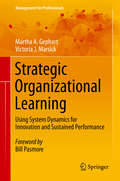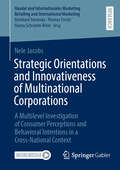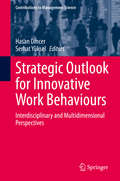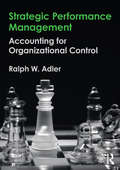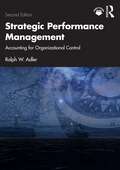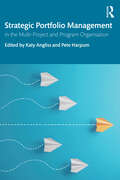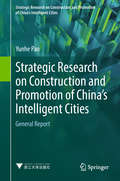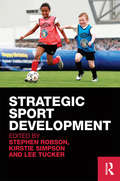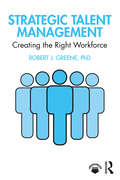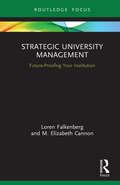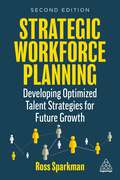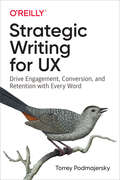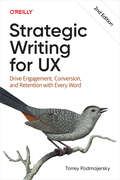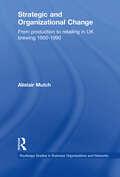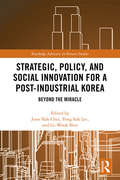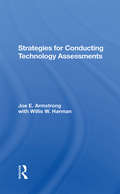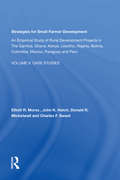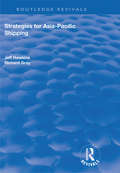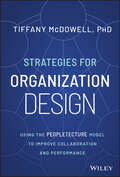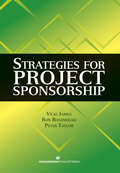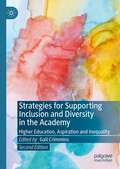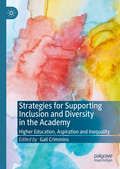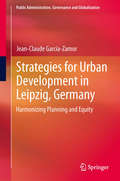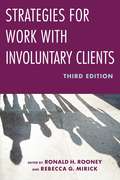- Table View
- List View
Strategic Organizational Learning
by Martha A. Gephart Victoria J. MarsickThis book discusses the successes and challenges of leveraging organizational learning in effective strategy development and execution. The authors introduce a framework that helps organizations develop core capabilities to enable them to shift direction rapidly and proactively shape future environments. They also offer a wide selection of cases to illustrate this framework. While some cases highlight fundamental strategic change over time, others are snapshots of mechanisms gradually put in place to jointly optimize learning and performance. There is no one best or right way to leverage strategic organizational learning; different practices may lead to the same outcome and similar practices may lead to different outcomes. The system dynamics underlying such learning -- not the simple adoption of one or other practice -- are key to success in institutionalizing a performance-based learning approach.
Strategic Orientations and Innovativeness of Multinational Corporations: A Multilevel Investigation of Consumer Perceptions and Behavioral Intentions in a Cross-National Context (Handel und Internationales Marketing Retailing and International Marketing)
by Nele JacobsMultinational corporations (MNCs) face significant challenges in a dynamic global business environment. In times of economic hardship and increased competition, innovativeness and the demonstration of key abilities are essential to the success and resilience of MNCs. In her research, Nele Jacobs adopts a theory-based approach to examine the interplay between a firm&’s perceived strategic orientations, innovativeness, special corporate abilities, and consumer responses in an international context. Furthermore, Jacobs provides valuable insights into the differences in consumer cognition and behavior caused by critical country-level boundary conditions.
Strategic Outlook for Innovative Work Behaviours: Interdisciplinary and Multidimensional Perspectives (Contributions to Management Science)
by Hasan Dincer Serhat YükselThis book presents various perspectives on innovative work behaviour, focusing on problem recognition, idea generation, idea promotion and the realisation of these ideas. It first highlights important corporate issues, such as uncertainty, performance management, technological infrastructure, and strategy development, and subsequently presents studies that offer solutions. Further, the book evaluates the significance of research and development, effective communication and corporate governance. Lastly, it discusses the implications of idea realisation, examining resource dependence theory, organizational trust and eco-innovations.
Strategic Performance Management: Accounting for Organizational Control
by Ralph W. AdlerOne of the most important challenges that people in senior management positions face is the responsibility of ensuring their organizations’ effective practice of performance management. As this book reveals, performance management comprises an interdisciplinary field of study and practice that draws upon a wide set of business disciplines, including strategic management, organizational behaviour, organizational theory, and management accounting. This book provides a contemporary examination of theories, issues, and practices related to performance management. An original performance management framework helps structure the book, and in particular the ordering and layout of the book’s chapters. Unlike other performance management frameworks, the one used here is grounded in concrete organizational phenomena, therefore making it more accessible and meaningful to practitioners, scholars, and students.
Strategic Performance Management: Accounting for Organizational Control
by Ralph W. AdlerEffective performance management is core to successful organizations. The new edition continues to look at performance management as an interdisciplinary field of study and practice and draws upon a wide set of business disciplines, including strategic management, organizational behaviour, organizational theory, and management accounting. The book provides a contemporary examination of theories, issues, and practices related to performance management with an original performance management framework, grounded in concrete organizational phenomena, therefore making it more accessible and meaningful to practitioners, scholars, and students. The updated edition also examines organizations’ evolving use of digital business transformation and the effect on performance management design. With updated cases, the latest edition will help readers to gain insights into the fields of strategic management, organizational behaviour, organizational theory, and management accounting and how they contribute to the study and practice of performance management.
Strategic Portfolio Management: In the Multi-Project and Program Organisation
by Pete Harpum Katy AnglissThis book provides a powerful insight into strategic portfolio management and its central role in the delivery of organisational strategy, maximisation of value creation, and efficient allocation of resources and capabilities to achieve organisational strategic objectives. The book makes a valuable contribution to the development of thinking on the translation of strategy into actionable work. Whether you are a senior manager building a high-performing strategic portfolio for your organisation or an academic searching for new perspectives on strategy execution through portfolio management, you will find great significance in this book. Twenty-eight chapters in four sections provide multiple perspectives on the topic, with in-depth guidance on organisational design for strategic portfolio management and covering all process, capability, and leadership aspects of strategic portfolio management. The book includes several detailed case studies for the effective deployment of strategic portfolios, bringing together theory and practice for strategic portfolio management. This book is particularly valuable for advanced undergraduate and postgraduate students of project and portfolio management, strategic management, and leadership who are looking to expand their knowledge within the multi-project environment. Highly practical and logical in its structure, it also shows project management professionals how to effectively manage their business portfolios and align this with their business strategy.
Strategic Research on Construction and Promotion of China's Intelligent Cities: General Report (Strategic Research On Construction And Promotion Of China's Intelligent Cities Ser.)
by Yunhe PanThis book includes a general overview of the book series and summarizes the research results in its 13 subtopics. It systematically elaborates on how the construction and promotion of intelligent cities with Chinese characteristics could be implemented in the course of intelligent urbanization in China. Furthermore, it presents a variety of literature on urban management innovation and development, making it a valuable reference source on both the theoretic and empirical development of the new urbanization in China for intelligent-city decision-makers, c-level directors and officials in urban economy, social and environment departments and institutions all over the world.
Strategic Sport Development
by Stephen Robson Kirstie Simpson Lee TuckerThe field of sports development is becoming ever more professional, with the levels of expertise in planning and efficiency required of those working in private or national sports institutions higher than they have ever been. In response to this, strategic sports development has emerged as a means of applying business strategies to the context of sports development. Strategic Sports Development is the first book to directly address this important new field. The book comprehensively explains the strategic concepts and techniques that sports students and practitioners across the UK and internationally need to understand. It includes: national and local case studies that appraise existing strategic management practice in sports development separate full introductions to sports development and business strategy a range of tasks and resources that encourage the reader to develop knowledge, skills and competencies through the application of theory to practical examples the application of strategic management principles to the development of sport and development through sport everything the reader needs to engage meaningfully with the relevant National Occupational Standards for the sport development profession. Strategic Sports Development is designed to help students develop the practical skills needed to contribute to development strategy in a vocational context, and give practitioners the confidence and know-how to improve the strategic development of their sports organization. This book is essential reading for all students and practitioners of strategic sports development, and a valuable resource for students of sports management or development in general.
Strategic Talent Management: Creating the Right Workforce
by Robert GreeneClearly written and providing actionable strategies, this book explores new paradigms for workforce management to enable human resource managers and the organizations where they work to thrive in today’s turbulent business environment. Robert Greene goes beyond the many human resource management books currently available, to deal head-on with the new realities of talent management, including such factors as the "gig economy" and globalization. The book focuses on attracting, developing, and effectively utilizing human capital. It begins with human capital planning, and then explores strategies and programs that can attract and retain the workforce an organization needs. A range of sizes and types of organizations and different working relationships are considered, as Greene demonstrates how to evaluate the effectiveness of strategies that fit specific contexts and will sustain the viability of an organization’s workforce into the future. Postgraduate students of human resource management, as well as current HR professionals and managers, will find this practical book an indispensable resource. PowerPoint slides and test banks are available to support instructors.
Strategic Thinking Illustrated: Strategy Made Visual Using Systems Thinking
by Dennis SherwoodThis book is about the behaviour of systems. Systems are important, for we interact with them all the time, and many of the actions we take are influenced by a system – for example, the system of performance measures in an organisation influences, often very strongly, how individuals within that organisation behave. Furthermore, sometimes we are involved in the design of systems, as is any manager contributing to the definition of what those performance measures might be. That manager will want to ensure that all the proposed performance measures will drive the ‘right’ behaviours rather than (inadvertently) encouraging dysfunctional ‘game playing’, and so anticipating how the performance measurement system will work in practice is a vital part of a wise design process. Some of the systems with which we interact are local, such as your organisation’s performance measurement system. Some systems, however, are distant, but nonetheless very real, such as the healthcare system, the education system, the legal system and the climate system. Systems, therefore, exist on all scales, from the local to the global. And all systems are complex, some hugely so. That’s why understanding how systems behave can be very helpful. Systems are complex for two main reasons. First, the manner in which they behave over time can be very hard to anticipate – and anticipating the future sensibly is of course a key objective of management. Second, the ‘entities’ within a system can be connected together in very complex ways, so that an intervention ‘here’ can result in an effect ‘there’, perhaps a long time afterward. Sometimes this can be surprising, and so we talk of ‘unintended consequences’ – but this is of course a euphemism for ‘because I didn’t understand how this system behaves, I had not anticipated that’. Systems thinking, the subject matter of this book, is the disciplined study of systems, and causal loop diagrams – the ‘pictures’ of this ‘picture book’ – are a very insightful way to represent the connectedness of the entities from which any system is composed, so taming that system’s complexity.
Strategic University Management: Future Proofing Your Institution (Routledge Focus on Business and Management)
by Loren Falkenberg M. Elizabeth CannonUniversities are being buffeted by multiple disruptive trends, including increased competition for both funding and students, as well as from new institutions that are nimbler and more responsive to the external environment. To survive this reality, university leaders must engage in effective strategic planning that cascades from the president or vice-chancellor’s office to individual faculty and staff. Outcomes of an effective institutional strategy are the alignment of resource allocation with strategic goals, and the facilitation of clear and transparent decision-making for new program development, research capacity growth, and infrastructure investment. With increasing expectations for university leaders to engage in strategic planning, Strategic University Management: Future Proofing Your Institution provides a practical framework for managing the process and delivering results. This book illustrates that the inherent weaving of strategic planning and organizational culture through engaged consultation facilitates a culture of responsiveness, rather than complacency. Providing an in depth overview of the value strategy can create in universities, it provides a framework for initiating, implementing and assessing strategic planning in a university setting that will make it valuable to researchers, academics, university leaders, and students in the fields of strategic planning, organizational studies, leadership, and higher education management.
Strategic Workforce Planning: Developing Optimized Talent Strategies for Future Growth
by Ross SparkmanStrategic workforce planning can often be complex and technical, so how can organizations demystify the processes to effectively prepare for current and future workforce requirements? Strategic Workforce Planning is a comprehensive guide that explains what it is, why it's necessary and most importantly, how to do it. It enables HR professionals to understand and resolve core business matters, from analysing future hiring demand to prioritizing investments like training and development. It also covers how to manage the impact of artificial intelligence (AI), automation and machine learning on the global workforce. This fully updated second edition features a new chapter on remote working strategies and operational workforce planning, as well as new and updated case studies and material on workforce planning in a downturn and for Diversity and Inclusion. Providing fresh perspectives alongside the fundamental theory, Strategic Workforce Planning is essential reading for practitioners of all levels of experience looking to align people strategy with company strategy and maintain competitive advantage.
Strategic Writing for UX: Drive Engagement, Conversion, and Retention with Every Word
by Torrey PodmajerskyWhen you depend on users to perform specific actions—like buying tickets, playing a game, or riding public transit—well-placed words are most effective. But how do you choose the right words? And how do you know if they work? With this practical book, you’ll learn how to write strategically for UX, using tools to build foundational pieces for UI text and UX voice strategy.UX content strategist Torrey Podmajersky provides strategies for converting, engaging, supporting, and re-attracting users. You’ll use frameworks and patterns for content, methods to measure the content’s effectiveness, and processes to create the collaboration necessary for success. You’ll also structure your voice throughout so that the brand is easily recognizable to its audience.Learn how UX content works with the software development lifecycleUse a framework to align the UX content with product principlesExplore content-first design to root UX text in conversationLearn how UX text patterns work with different voicesProduce text that’s purposeful, concise, conversational, and clear
Strategic Writing for UX: Drive Engagement, Conversion, and Retention with Every Word
by Torrey PodmajerskyWhen you depend on users to perform specific actions—like buying tickets, playing a game, or riding public transit—well-placed words are most effective. But how do you choose the right words? And how do you know if they work? With this practical book, you'll learn how to write strategically for UX, using tools to build foundational pieces for UI text and UX voice strategy. This second edition by Torrey Podmajersky is an essential resource, thoroughly updated to incorporate the latest in collaborative tools and considerations for AI-generated UX content. It reflects significant advancements in the field of content design, updating every chapter with the latest UX methods and styles. Understand the integration of UX content with the software development lifecycle Learn content-first design to anchor UX text in meaningful dialogue Apply UX text patterns effectively across varied brand voices Enhance product usability and conversion with strategic UI text applications Clearly articulate the business value of dedicated UX content efforts
Strategic and Organizational Change: From Production to Retailing in UK Brewing 1950-1990 (Routledge Studies in Business Organizations and Networks #Vol. 33)
by Alistair MutchThe brewing industry, through its network of public houses, has a profound impact on the lives of much of the population of United Kingdom. Exploring the shaping of this industry in the years from 1950-1990, this book shows how it has moved from being largely concerned with the technical issues of production to being a key part of the retail industries. Drawing from theoretical traditions such as critical realism and new institutionalism, Strategic and Organizational Change demonstrates the considerable differences between major companies in the industry and the ways in which they have adopted a retailing approach. At the heart of the book is an exploration of the relationship between managerial choice and the structural constraints and opportunities in which that choice was exercised. Providing a new model of how history can inform the analysis of organizational strategy, the book draws on extensive archival material and adopts a far more historical approach than previous accounts of the area. Above all, Alistair Mutch presents a fascinating story of change in an industry which is taken for granted, but whose actions affect, for good or ill, the lives of millions.
Strategic, Policy and Social Innovation for a Post-Industrial Korea: Beyond the Miracle (Routledge Advances in Korean Studies)
by Gi-Wook Shin Joon Nak Choi Yong Suk LeeExport-oriented industrialization has transformed the Korean economy so profoundly that it has become known as the "Miracle on the Han." Yet, this industrial model has become fragile, as Korea’s chaebols are being challenged by Chinese competitors. Attempts to seek out new engines of economic growth have failed, or remain underdeveloped, while a looming demographic crisis threatens to exacerbate Korea’s problems. This book outlines a blueprint for overcoming these challenges, moving beyond the business strategies, government policies, and socio-cultural patterns established under export-oriented industrialization. Written by a stellar line-up of international contributors, its central proposition is that social change is needed to support the strategic and operational transformation of the chaebol and SMEs. Specifically, it stresses the need for an appreciation of the gender, national, and ethnic diversity emerging within the Korean workplace today. If properly leveraged, such diversity has the potential to reduce the groupthink that hampers the creativity and responsiveness of Korean firms today, as well as facilitating greater success in overseas markets. Taking an interdisciplinary approach, this book will be useful to students and scholars in Korean Studies, as well as those studying business, economics, and sociology more broadly in East Asia.
Strategies For Conducting Technology Assessments
by Willis W. Harman Joe E. ArmstrongUsing reviews of special reports and personal interviews with team members of recent National Science Foundation-sponsored assessments, the authors have assembled an eight-step functional strategy for conducting technology assessments. The steps are set within a framework that embodies the three key elements of all assessments: technology descripti
Strategies For Small Farmer Development: An Empirical Study Of Rural Development Projects In The Gambia, Ghana, Kenya, Lesotho, Nigeria, Bolivia, Columbia, Mexico, Paraguay And Peru
by Elliott R. Morss Donald R. Mickelwait John K. Hatch Charles F. SweetThis volume provides information on what can be done to increase the well-being and productivity of the small farmer in the Third World, focusing on design and implementation of rural development projects in the Gambia, Ghana, Kenya, Lesotho, Nigeria, Bolivia, Colombia, Mexico, Paraguay and Peru.
Strategies for Asia-Pacific Shipping (Routledge Revivals)
by Richard Gray Jeff HawkinsThis title was first published in 2000. This text focuses on one geographical and economical area - the Asia-Pacific region, on one type of decision makers - commercial shipowners, and on one type of business strategy - corporate level strategy, to show economic change and how organizations manage that change. This book discusses the challenges that shipowners face to take advantage of that growth. It also looks at the lack of information on strategic decision making that could assist the shipowners in taking advantage of the economic situation. The chapters cover the types of business strategies available and how to select the criteria for selecting one of those strategies.
Strategies for Organization Design: Using the Peopletecture Model to Improve Collaboration and Performance
by Tiffany McDowellDesign better organizations with humans at the center In Strategies for Organization Design: Using the Peopletecture Model to Improve Collaboration and Performance, EY’s People Advisory Principal, Dr. Tiffany McDowell, delivers an insightful exploration of organization design. Dr. McDowell combines expertise in both applied management and psychology to solve stubborn company challenges with practical solutions. Readers will have the opportunity to apply these solutions immediately to create positive impact, deal with rapid change, and consistently innovate at scale. In the book, you’ll learn to: Accelerate organizational transformation in a data-driven and evidence-based way Make your organization’s work mean and matter more to the people doing it Use insights drawn from network science, human motivation, behavioral economics, and organization theory to drive meaningful collaborationA groundbreaking, yet accessible new approach to building an exciting, innovative, and future-proofed organization, Strategies for Organization Design deserves a place in the hands of managers, executives, and other business leaders—as well as the consultants and specialists who serve them and their companies—who are looking for hands-on solutions twenty-first century business challenges.
Strategies for Project Sponsorship
by Peter Taylor Vicki James Ron RosenheadOptimize the Role of the Project Sponsor The project sponsor is critical to project success, yet it is a role that is often assigned to a member of the organization with little knowledge or training in project management practices. This creates challenges not only for the sponsor but for the project manager. The organization suffers too if key members of the project team are not fully utilized, as valuable resources are wasted. In Strategies for Project Sponsorship, the authors address this challenge from all three vantage points—that of the project manager, the project sponsor, and the organization. Based on their practical experience and solid research, they offer practical methods that project manager s can use to optimize the participation of the sponsor. They also offer clear and straightforward guidance for project sponsors on how to properly execute their duties and contribute to project success. Executives will gain valuable perspective on the organization's projects and key players. From defining the roles and responsibilities of the project sponsor to suggesting specific practices that maximize the working relationship between the sponsor and project manager, this book is the ultimate guide. Examples from real-world sponsor experiences, as well as tips, techniques, and tools, enhance its applicability and practicality. This book should be given to every newly assigned project sponsor, read and referred to by every project manager, and on the desk of every organizational executive as a reference.
Strategies for Supporting Inclusion and Diversity in the Academy: Higher Education, Aspiration and Inequality
by Gail CrimminsThis book explores tried and tested strategies that support student and faculty engagement and inclusion in the academy. These strategies are anchored by a brief exploration of the history and effect/s of exclusion and deprivilege in higher education. However, while many publications exploring academic inequality focus on the causes and impacts of structural, psychological and cultural exclusion based on racism, sexism, classism and ableism, they rarely engage in interventions to expose and combat such de/privilege. Capturing examples of inclusive practices that are as diverse as student and faculty populations, these strategies can be easily translated and employed by organisations, collectives and individuals to recognise and combat social and academic exclusion within higher education environments.
Strategies for Supporting Inclusion and Diversity in the Academy: Higher Education, Aspiration and Inequality
by Gail CrimminsThis book explores tried and tested strategies that support student and faculty engagement and inclusion in the academy. These strategies are anchored by a brief exploration of the history and effect/s of exclusion and deprivilege in higher education. However, while many publications exploring academic inequality focus on the causes and impacts of structural, psychological and cultural exclusion based on racism, sexism, classism and ableism, they rarely engage in interventions to expose and combat such de/privilege. Capturing examples of inclusive practices that are as diverse as student and faculty populations, these strategies can be easily translated and employed by organisations, collectives and individuals to recognise and combat social and academic exclusion within higher education environments.
Strategies for Urban Development in Leipzig, Germany
by Jean-Claude Garcia-ZamorThe demographic pressure caused by migration offers a considerable challenge for urban centers today. It results in an uneven development of the community and focus of urban planners becomes how to provide decent, low-cost housing and transportation in order to facilitate the integration of poorer residents among the rest of the community. In large industrialized countries the challenges of urban policy-makers are made even more complicated since these governments depend on state or federal legislators to obtain the massive amounts of funding required for adequately addressing these local issues that are in global cause. The book analyzes the strategies for urban development in Leipzig, Germany, and shows how civic leaders were able to harmonize planning and equity. They relied heavily on two interesting approaches in that process: the promotion of culture as a key component of urban development and the reconciliation of the inevitable process of gentrification with social equity. The book also looks at the globalization aspect of urban development, reviews research in social equity in urban development in Europe and the United States and describes sustainability as an important element of urban renaissance.
Strategies for Work with Involuntary Clients
by Ronald H. Rooney Rebecca MirickOften in their careers, social workers will encounter clients who are either legally required to attend treatment services or are otherwise coerced or pressured into those services. Practitioners in settings from prisons to emergency rooms to nursing homes to child protection agencies will find themselves with involuntary clients. In an update to this classic text, social workers Ronald H. Rooney and Rebecca G. Mirick explore the best ways to work with unwilling clients.While work with involuntary clients is common, it can be challenging, frustrating, and unproductive unless practitioners are well trained for it. This book provides a theoretical framework for understanding the legal, ethical, and practical concerns when working with involuntary clients, offering theory, treatment models, and specific practice strategies influenced by the best available knowledge. Animated by case studies across diverse settings, these resources can be used by practitioners to facilitate collaborative, effective working relationships with involuntary clients.
